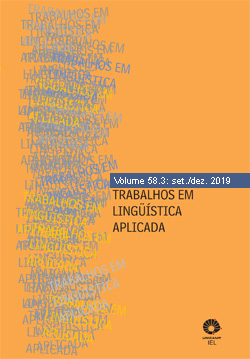Resumo
Baseando-se nas filosofias pós-estruturalistas foucaultiana e derridiana, nas abordagens sociológicas da linguagem de Sousa Santos e Menezes de Souza, na conceituação produtiva de cultura de Stuart Hall e nos estudos visuais de Mirzoeff, Stam e Shohat, este artigo busca relacionar cultura visual, tradução cultural e educação linguística. De natureza qualitativa e interpretativista, esta reflexão é dividida em cinco seções principais: na introdução, abordagens filosóficas e sociológicas em relação à linguagem visual e cultura são apresentadas. A seção um problematiza a cultura visual, por meio da genealogia de corpos invisíveis. A próxima seção explora a evolução do modelo de tradução gramatical para a tradução cultural na cultura visual. Em seguida, o artigo revisita e desconstrói modelos de letramento dominantes por meio da tradução cultural. Finalmente, esta perspectiva genealógica em relação ao visual mostra que as formações históricas tradicionais retornaram aos cenários políticos e educacionais em nosso país e infelizmente têm promovido uma política de manipulação e alienação.
Referências
BAKHTIN, M. (Volosinov). (1981). The dialogic Imagination. Austin: University of Texas.
BLOMMAERT, J.; RAMPTON, B. (2011) Language and Superdiversity. Diversities, vol. 13, n. 2, UNESCO.
DERRIDA, J. (1978). Structure, Sign and Play in the Discourse of the Human Sciences. In (DERRIDA, J.). Writing and Difference, trans. Alan Bass. Chicago: University of Chicago Press, pp. 278-93.
GARCÍA, O. & WEI, L. (2014). Translanguaging: language, bilingualism, and education. New York, NY: Palgrave MacMillan.
HALL, S. (1997). Representation: Cultural representation and Signifying Practices. London, Thousand Oaks, New Delhi: Sage Publications.
LATOUR, B. (1993). We Have Never Been Modern. trans. Catherine Porter. Harvard University Press. Cambridge, Massachusetts.
McCLINTOCK, A. (1998). Soft-Soaping Empire. Commodity Racism and Imperial Advertising. In The Visual Culture Reader. MIRZOEFF, Nicholas, ed. London: Routledge, pp. 304-316.
MENEZES DE SOUZA, L. M. T. (2004). Hibridismo e Tradução Cultural em Bhabha. In ABDALA JUNIOR, Benjamin (Org.). Margens da Cultura: mestiçagem, hibridismo & outras misturas. São Paulo: Boitempo, pp. 113-133.
MENEZES DE SOUZA, L. M. T. (2007). CMC, hibridismos e tradução cultural: reflexões. Trab. linguist. apl., Campinas, v. 46, n. 1, pp. 09-17.
MENEZES DE SOUZA, L. M. T. (2009). Gaza 2009: notes on critically reading conflict. Critical Literacy: Theories and Practices, 3:1, pp. 86-89.
MENEZES DE SOUZA, L. M. T. (2011). Engaging the Global by Resituating the Local (Dis)locating the Literate Global Subject and His View from Nowhere. In: Oliveira Andreotti, V.; Souza, L. M. T. M.. (Org.). Postcolonial Perspectives on Global Citizenship Education. Londres: Routledge, pp. 68-86.
MIGNOLO, W. D.; SCHIWY, F. (2002). Beyond Dichotomies: Translation/ Transculturation and the Colonial Difference. In MUDIMBE-BOYI, E. (Ed.). Beyond Dichotomies: Histories, Identities, Cultures, and the Challenge of Globalization. Albany: State University of New York Press, pp. 251-286.
MIRZOEFF, N. (1998). The Visual Culture Reader. London: Routledge.
MORRA, J; SMITH, M. (eds) (2006). Visual Culture: critical concepts in media and cultural studies. London and New York: Routledge.
NGUGI, wa T. (1986). Decolonizing the Mind: the politics of language in African literature. Nairobi: Heinemann Kenya.
PETERS, M. A.; BIESTA, G. (2009). Derrida, deconstruction, and the politics of pedagogy. New York: Peter Lang.
ROBERTSON, R. (1995). Glocalization: Time-Space and Homogeneity-Heterogeneity, in M. FEATHERSTONE et al., Global Modernities. London: Sage, p. 25-54.
ROGOFF, I. (2002). Studying Visual Culture. In: MIRZOEFF, N (ed.). The Visual Culture Reader. 2nd Ed. London: Routledge, pp. 24-36.
SAID, E. (1993). Culture and Imperialism. New York: Alfred A. Knopf.
SANTOS, M. (2002). O país distorcido: o Brasil, a globalização e a cidadania. São Paulo: Publifolha.
SEIDMAN, S. (1994). The Postmodern Turn: new perspectives on social theory. Cambridge: Cambridge University Press.
SCHWARTZ, S. (1996). Brazilian Ethnogeneses: Mestiços, mamelucos and pardos. In: GRUZINSKY, S. & WACHTEL, N. (ed.). Le nouveau monde, Monde nouveau: L´experience américaine. Paris: L´École des Hautes Études em Sciences Sociales.
SHLOWIY, A. A. (2014). Texting Abbreviations and Language Learning. International Journal of Arts and Sciences, 07(03), pp. 455-468.
SHOHAT, E.; STAM, R. (2002). Narrativizing visual culture. Towards a polycentric aesthetic. In: MIRZOEFF, N. (Ed.) The Visual Culture Reader. 2 ed. London & New York: Routledge.
SOUSA SANTOS, B. (2018). The End of the Cognitive Empire: the coming of age of epistemologies of the South. Durham and London: Duke University Press, 2018.
TODD, S. (2009). Towards an imperfect education: facing humanity, rethinking cosmopolitanism. London: Paradigm Publishers.
TODD, S. (2016). Toward an Imperfect Education: Facing humanity, Rethinking Cosmopolitanism. New York: Routledge.
O periódico Trabalhos em Linguística Aplicada utiliza a licença do Creative Commons (CC), preservando assim, a integridade dos artigos em ambiente de acesso aberto, em que:
- A publicação se reserva o direito de efetuar, nos originais, alterações de ordem normativa, ortográfica e gramatical, com vistas a manter o padrão culto da língua, respeitando, porém, o estilo dos autores;
- Os originais não serão devolvidos aos autores;
- Os autores mantêm os direitos totais sobre seus trabalhos publicados na Trabalhos de Linguística Aplicada, ficando sua reimpressão total ou parcial, depósito ou republicação sujeita à indicação de primeira publicação na revista, por meio da licença CC-BY;
- Deve ser consignada a fonte de publicação original;
- As opiniões emitidas pelos autores dos artigos são de sua exclusiva responsabilidade.


